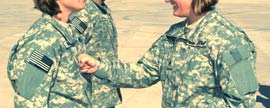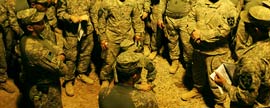Don’t Get Discouraged: first do not to get discouraged. The great part about the military is someone is always rotating to a new position. The sergeant will rotate to another unit, typical tours overseas are 3 years. The sergeant may only have a few months left. Your son might be selected for another job within the unit or be reassigned to another squad or platoon within the unit.
Army Regulation on Bullying: Army Regulation AR 600-20 specially prohibits abuse, hazing, harassing, and bullying of Soldiers. Is States:
Extract of Army Regulation 600-20 on Bullying: Paragraph 4–19. Treatment of persons The Army is a values-based organization where everyone is expected to do what is right by treating all persons as they should be treated – with dignity and respect. Hazing, bullying, and other behaviors that undermine dignity and respect are fundamentally in opposition to our values and are prohibited. This paragraph is punitive. Soldiers who violate this policy may be subject to punishment under the UCMJ. Whether or not certain acts specifically violate the provisions of this paragraph, they may be inappropriate or violate relevant civilian personnel guidance. Commanders must seek the advice and counsel of their legal advisor when taking actions pursuant to this paragraph. a. Definition.
(1) Hazing. Any conduct whereby a Servicemember or members regardless of service, rank, or position, and without proper authority, recklessly or intentionally causes a Servicemember to suffer or be exposed to any activity that is cruel, abusive, humiliating, oppressive, demeaning, or harmful. Soliciting or coercing another to participate in any such activity is also considered hazing. Hazing need not involve physical contact among or between military members or employees; it can be verbal or psychological in nature. Likewise, it need not be committed in the physical presence of the victim; it may be accomplished through written or phone messages, text messages, email, social media, or any other virtual or electronic medium. Actual or implied consent to acts of hazing does not eliminate the culpability of the perpetrator. Without outside intervention, hazing conduct typically stops at an identified end-point.
(2) Bullying. Bullying is any conduct whereby a Servicemember or members, regardless of service, rank, or position, intends to exclude or reject another Servicemember through cruel, abusive, humiliating, oppressive, demeaning, or harmful behavior, which results in diminishing the other Servicemember’s dignity, position, or status. Absent outside intervention, bullying will typically continue without any identifiable end-point. Bullying may include an abuse of authority. Bullying tactics include, but are not limited to, making threats, spreading rumors, social isolation, and attacking someone physically, verbally, or through the use of electronic media.
b. Scope – What constitutes Hazing and Bullying in the Army.
(1) What constitutes hazing and bullying? Hazing and bullying can include both physical and nonphysical interactions. Hazing typically involves conduct directed at new members of an organization or individuals who have recently achieved a career milestone. It may result from any form of initiation, “rite of passage,” or congratulatory act that includes unauthorized conduct such as: physically striking another while intending to cause, or causing, the infliction of pain or other physical marks such as bruises, swelling, broken bones, internal injuries; piercing another’s skin in any manner; forcing or requiring the consumption of excessive amounts of food, alcohol, drugs, or other substances; or encouraging another to engage in illegal, harmful, demeaning, or unauthorized dangerous acts. Unlike hazing, bullying often, but not always, takes the form of excessive corrective measures that, like hazing, involve the infliction of physical or psychological pain and go beyond what is required for authorized corrective training.
(2) Hazing and bullying are not limited to superior-subordinate relationships. They may occur between peers or, under certain circumstances, may involve actions directed towards senior personnel by those junior in rank, grade, or position to them. Hazing may occur during graduation or promotion ceremonies or similar military “rites of passage.” However, it may also happen in military settings, such as in small units, to initiate or “welcome” a new member to the unit. Bullying may also occur in all settings but it most often appears as excessive correction of, or punishment for, perceived performance deficiencies. Hazing and bullying are prohibited in all cases, to include off-duty or “unofficial” celebrations or unit functions, on or off post. 30 AR 600–20 • 6 November 2014
(3) What does not constitute hazing or bullying in the Army?
(a) Hazing may occur when otherwise authorized or permissible conduct crosses the line into impermissible conduct. Bullying is always committed with the intent to exclude or reject another from inclusion in a group and, while the bullying conduct may appear to be corrective training, it is never authorized or permissible. The imposition of necessary or proper duties and the requirement of their performance does not violate this policy even though the duties may be arduous, hazardous, or both. When authorized by the chain of command and/or operationally required, the following activities do not constitute hazing or bullying:
(1) the physical and mental hardships associated with operations or operational training;
(2) lawful punishment imposed pursuant to the UCMJ;
(3) administrative corrective measures, including verbal reprimands and command-authorized physical exercises;
(4) extra military instruction or corrective training that is a valid exercise of military authority needed to correct a Soldier’s deficient performance in accordance with paragraph 4–6;
(5) physical training and remedial physical training; and
(6) other similar activities that are authorized by the chain of command and conducted in accordance with this or another applicable regulation.
(b) Many time-honored customs of the Army include traditional events that celebrate personal milestones and professional achievements. These events are part of our heritage and include hails and farewells, promotion and graduation ceremonies, and other official command functions. When properly organized and supervised, these events serve to enhance morale, esprit de corps, pride, professionalism, and unit cohesiveness. The chain of command will ensure these traditions and customs are carried out in accordance with Army values and that the dignity and respect of all participants is maintained. (c) The willingness of any participant is irrelevant; therefore, express or implied consent to prohibited behaviors under this paragraph is not a defense to a violation of this regulation.
c. Command responsibilities as they pertain to Bullying and Hazing in the Army.
(1) Enforcement of this policy is the responsibility of commanders and supervisors at all levels.
(2) Publish and post written command policy statements on treatment of persons. Statements will be consistent with the Army policy, include the local command’s commitment to prevention of hazing and bullying, and reaffirm that these behaviors will not be tolerated. The command policy will explain how and where to file complaints and will state that all complainants will be protected from acts or threats of reprisal. Each ACOM, ASCC, DRU, installation, unit, agency, and activity down to company, troop, or battery level will publish a treatment of persons policy. Commanders must consult with their legal advisor prior to publishing.
(3) Conduct training. On at least an annual basis, commanders will conduct hazing and bullying training as part of the EO training requirements related to promoting a healthy unit climate.
(4) Commanders will immediately report allegations of criminal behavior in violation of this paragraph to law enforcement. All other hazing or bullying allegations that are reported to a commander will be investigated as possible violations of Article 92 of the UCMJ in accordance with the informal board procedures set forth in AR 15–6 or as a commander’s inquiry. Individuals may also report incidents of hazing to the appropriate Inspector General’s office and these incidents may be investigated by that office or referred to the command for investigation. Regardless of the type of investigation conducted into the hazing or bullying allegation (law enforcement, IG, or administrative), commanders are responsible for coordinating with their unit Equal Opportunity Advisor (EOA) to ensure that all hazing or bullying allegations are recorded and tracked in the Equal Opportunity Reporting System (EORS). Although administrative investigations into hazing or bullying are not EO investigations, EOAs will ensure that these incidents are recorded in EORS for tracking purposes. If a Soldier possesses a security clearance, commanders will ensure the security manager records the derogatory information as an incident report in the JPAS (or subsequent system) in accordance with AR 380–67.
d. Individual responsibilities. Individuals are responsible for the following:
(1) Advising the command of any incidents of hazing or bullying.
(2) Conducting themselves in accordance with this paragraph and treating all persons as they should be treated – with dignity and respect.
e. Individual reporting. Servicemembers should report hazing or bullying to their commander, law enforcement, or the Inspector General.
Things to Consider When it Comes to Hazing and Bullying in the Army:
There are several courses of action which can include:
- Do Nothing: First, if the leader is truly hazing, harassing, bullying, or otherwise mistreating the Soldier there is no excuse. Some people are just not good leaders. You will encounter good and bad leaders in the civilian world as well as the Army. The only difference is you can’t quit the Army. This option can seem unreasonable but sometimes ignoring the behavior is the best option. The Soldier should also ask themselves a few questions: 1. Does the leader treat other people this way or just me? (2) Am I living up to my duties and responsibilities (do my job correctly)? (3) What is the root cause of the behavior? Asking these questions forces the Soldier to look at themselves first to ensure they are looking at the whole picture. The questions are not designed to put blame or focus the problem on the Soldier. Again regardless if a Soldier is being mistreated there is absolutely no excuse for this behavior.
- Report the Problem to the Chain of Command: In accordance with the regulation paragraph 4-19d the Soldier has a responsibility to report the issue to the chain of command usually by asking to see the Commander and First Sergeant on open door policy. At this time the Soldier presents their grievance against the leader. It is usually best to present the complaint in writing. The document must be well thought out, factual, free of emotion, and state the impact the leader’s behavior is having on the Soldier. It may also address potential solutions such as: The Soldier just wants the behavior to stop, or the Soldier would like to be transferred to another squad or platoon within the unit.
- Repot the Problem to the Inspector General: The Soldier has the right to contact the inspector general and report the problem if they do not feel like they will receive fair treat from the chain of command. Keep in mind the Inspector General simply opens a case file, calls the unit and tells the unit they have a problem that must be resolved. The Soldier is called in and the problem is addressed. Then the command reports back to the Inspector General as to how the issue was resolved. Usually it is best to report the issue through the unit Commander first. The goal is to solve the problem at the lowest level possible.
Retribution: There are times when reporting an issue can just make the issue worse. However, this means the Soldier will have to stand their ground and continue to report the behavior or submit to the abusive behavior. This a Soldier’s choice. The command can only fix the problem if they know it exists.
Things to Consider When Reporting Bullying or Hazing in the Army:
- Most leaders want to do what is right and will fix the issue. However, the Soldier must choose to report the problem in a professional, factual, and calm manner so that the command views the complaint as legitimate not just a Soldier complaining.
- When reporting the issue consider submitting it in writing to the Commander and First Sergeant during open door hours. It is best for the Soldier to inform the Platoon Sergeant and Platoon Leader that they desire to see the Commander on open door policy. Sometimes they will fix the problem before it ever gets to the Commander. If the Platoon Sergeant and Platoon Leader take action to fix the problem and it later resurfaces then it can still be taken to the Commander.
- The Soldier can also request relief from the situation by asking to be transferred to another squad or platoon within the unit. (This is sometimes granted but not always.)
They can even ask to be transferred to another unit within the battalion (this is rarely granted)
- Once the Soldier has reported the issue to the Company Commander if the behavior continues the Soldier has the right to continue to report the issue up the chain of command to their Battalion and Brigade Commanders. It is rare for a problem to go this high in the chain of command.
- There is absolutely no excuse for mistreating Soldiers and leaders that do so need to be corrected and disciplined if conditions warrant such action. Only the Soldier can decide if this issue is worth reporting.
Facebook/Twitter/Newsletter
LIKE US:
Feedback
Hope this helps! Did
you find this information useful? We Appreciate your feedback!
Please Read! Help Us Help please tell your peers, subordinates, and superiors.
Also we are always looking for examples, classes, briefings, SOPs, templates
and other information we can share for free in the ASKTOP.net Armsroom. Please
help us help others by sending your ARMS ROOM stuff to:
mark.gerecht@mentorinc.us
This response is based on the information you provide. My comments do not represent the US Army or US government positions. Furthermore, my comments should be used for information purposes only.















Comments
Margie Capshew
Can a 1SG ask:
1.). Do you find yourself attractive?
2.). Are you dating anyone?
3.). Are you dating at all?